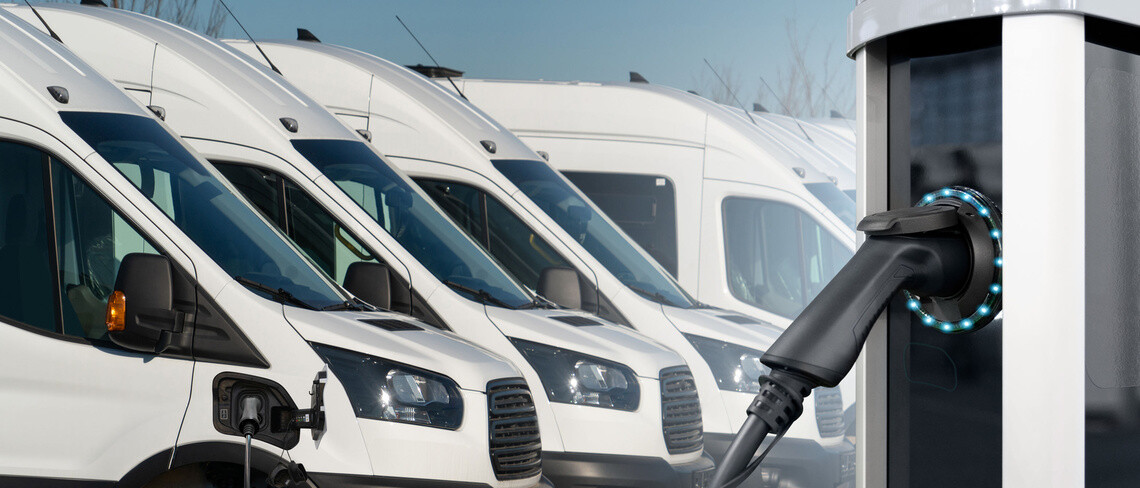
header hd
White transporter driving inside the city
The transportation industry today has a major impact on the environment. The tyre also plays an important role: tyre life cycle analyses show that the majority of its environmental impact is related to the use phase. Let's find out together which factors you should take into account when choosing a van tyre.
Stéphane Lam, Marketing Product Manager for Michelin’s Urban Business Line, tells us more.

stephanelam
Stéphane Lam, Marketing Product Manager
Michelin’s Urban Business Line
Criteria 1 - Longevity
The longer your tyre lasts, the less you use it and the less waste it generates.
On average, the MICHELIN Agilis CrossClimate tyre boasts minimum 25% more mileage than other main competitor summer and winter tyres and 39% more than its main all-season competitors(1,2,3).
To improve the mileage of your tyres, manufacturers are looking at the next step: connected tyres.
Indeed, these tyres will allow for predictive maintenance, thus keeping you from losing tyres. So, in short, they’ll last longer.
It won’t be long before the connected smart tyres already in use in the truck sector become available for utility vehicles and light trucks.
Criteria 2: Rolling resistance & compatibility with electric vehicles
With sales of new internal-combustion engine vehicles set to end in Europe in 2035, Michelin is studying innovative light-truck tyres that are compatible with the switch to electric.
The additional weight of the batteries, electric engine torque, and regenerative braking: all of these factors speed up tyre wear.
This is why it is essential to choose tyres with good rolling resistance*, which optimize the vehicle’s autonomy while maintaining proper driving and safety performances, whatever the driving conditions.
* This is the resistance that the tyres encounter when they roll on a given surface. The main causes are deformation of the tyre, aerodynamic drag and friction with the ground.
Criteria 3: Robustness
In harsh urban environments where vans are used intensively, impact on the tyre is common. A robust tyre, however, will better resist impact and therefore avoid premature disposal.
In this field, Michelin has been a pioneer in designing reinforced sidewall protectors in its special van range, MICHELIN Agilis.
Criteria 4: An all-season tyre
In Europe, the choice of tyres in the light truck and utility vehicle segment was, until now, split into two main seasons: summer and winter.
In 2018, Michelin pioneered the MICHELIN Agilis CrossClimate tyre, an uncompromising all-season tyre.
The challenge was to deliver a versatile tyre that was perfectly suitable in all seasons. It had to:
- - perform well on wet roads,
- - optimize braking and acceleration on snowy roads,
- - deliver good longevity and mileage,
- - be sufficiently robust, in particular on the sidewalls, to withstand aggressive urban use.
Moreover, the Michelin Group is leveraging features developed for bus tyre ranges, by including unique thick protector shields along the sidewall on its recent tyre ranges for Commercial Light Truck (CLT).
The MICHELIN Agilis CrossClimate tyre is packed with innovations that enhance safety, drivability and longevity, but maintains balanced performances to avoid boosting fuel consumption on either light trucks or utility vehicles.
In addition to these environmentally friendly levers, manufacturers are looking for new sustainable solutions. The Michelin Group has set itself the goal of using 40% of sustainable materials in all of its tyre components by 2030 and 100% of sustainable materials by 2050. Tyres will gradually be composed of recycled, bio-sourced and renewable materials.
(1) Longevity Tests conducted by DEKRA Test Center on Michelin’s request, in 2017, on dimension 235/65 R16C 115/113 R, on Mercedes-Benz Sprinter, in comparison with its major premium summer, winter & all-season competitors (SUMMER: MICHELIN Agilis CrossClimate (50145 km); BRIDGESTONE Duravis 660 (42760 km), CONTINENTAL ContiVanContact 100 (29660 km), WINTER MICHELIN Agilis CrossClimate (50412 km), CONTINENTAL VanContact Winter(32863 km), PIRELLI Carrier Winter(33009 km); ALL SEASON MICHELIN Agilis CrossClimate (47702 km) CONTINENTAL VanContact4Season (21396km), PIRELLI Carrier All Season(30467 km), GOODYEAR Vector 4 Seasons(29790 km))
Longevity test run in average real usage (D50) with 10,000 km run, and extrapolated with estimated longevity at 1.6mm.
(2) - longevity - Longevity Tests conducted by DEKRA Test Center on Michelin’s request in 2017, on dimension 235/65 R16C 115/113 R, on Mercedes-Benz Sprinter, in comparison with its major premium summer, winter and all-season competitors (SUMMER: MICHELIN Agilis CrossClimate (50145 km), BRIDGESTONE Duravis 660 (42760 km), CONTINENTAL ContiVanContact 100 (29660 km), WINTER: MICHELIN Agilis CrossClimate (50412 km), CONTINENTAL VanContact Winter (32863 km), PIRELLI Carrier Winter (33009 km), ALL SEASON: MICHELIN Agilis CrossClimate (47702 km) CONTINENTAL VanContact 4Season (21396km), PIRELLI Carrier All Season (30467 km), GOODYEAR Vector 4 Seasons (29790 km)).
Longevity test run in average real usage (D50) with 10,000 km run, and extrapolated with estimated longevity at 1.6mm.
(3) - longevity - Michelin internal study conducted in presence of DEKRA Test Center (Narbonne Track) in December 2020- February 2021, on dimension 235/65R16C 115/113 R, on Renault Master, MICHELIN Agilis CrossClimate (29789 km) in comparison with BRIDGESTONE Duravis All Season (22023 km).
Longevity test run in average real usage (D50) with 9,421km run, and extrapolated with estimated longevity at 1.6mm
Results may vary according to road and weather conditions

gettyimages 930571046
car going fast on a road by night







